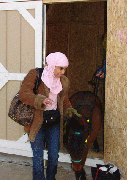DEARBORN — Being blind is tough. Being a blind, female, Muslim, 28-year-old Arab American living with parents is tougher.

|
|
Mona Ramouni and her miniature guide horse Cali prepare for their day Thursday morning inside a barn-like shed that Ramouni had placed outside her Dearborn home. PHOTOS: Khalil AlHajal/TAAN |
Always interested in new things that are available for blind people, Ramouni came across a website about miniature guide horses last April.
“It was something that I never thought about for myself,” said Ramouni.
But eloquent narratives written by a New York blind woman about having a waist-high, equine service animal got to her, and despite a series of obstacles that stood between her and having one of her own, Ramouni purchased Cali, her own guide horse in training, in October.
Cali is expected to become a permanent fixture at her Chase Road home in June. The miniature horse was in town this week for training alongside Ramouni.
“The more everybody told me ‘no, don’t do it,’ the more I wanted to do it,” she said. “I got to a point in my life where I thought… ‘Why should I settle for something less than I can have?'”
Born three months premature, Ramouni lost her vision as an infant, but what she lacks in eyesight, the University of Michigan-Dearborn psychology graduate student makes up for in determination.

|
|
Mona Ramouni, R, and Cali’s trainer Dolores Arste coax the miniature horse onto a bus to take them to Ramouni’s job at a Braille proofreading company in Lincoln Park. |
She spent two and a half years-worth of savings from her job at a Braille proofreading company in Lincoln Park to pay for Cali and the training.
She had to get a city permit to place a barn-like shed in her family’s yard, a second permit for the slab of cement it sits on and she had to petition to be allowed to put up a kennel fence.
Ramouni had to find a veterinarian and a farrier — to take care of the horse’s hooves — willing to make house calls. She’s had to find a distributor of food and a way to store the hay, hay pellets and grain.
“There have been so many obstacles,” Ramouni said. “People said ‘you’ll never find a vet. You’ll never find a farrier.’ I found them all.”
She’s learned during the visit from Cali and her trainer this week that taking care of the horse is no easy task.
“It’s hectic,” she said, “making sure that she’s fed, carrying water buckets… learning to communicate with her.”
Ramouni said the experience of getting the guide horse has boosted her resilient spirit as much as it’s improved her mobility.
“More than even the independence, I found that Cali showed me that there are possibilities,” she said.

|
|
Mona Ramouni smiles as she brings her miniature guide horse Cali out of its barn-like shed outside Ramouni’s Dearborn home Thursday morning. |
The horse can guide Ramouni through buildings, neighborhoods, traffic and it points out items of interest in her path like fire extinguishers.
Arste said it’ll take some time for Ramouni to learn all the nuances of letting Cali navigate.
“Cali’s had four months of training. Mona hasn’t,” Arste said.
The horse, Ramouni said, fits perfectly for her in part because culturally, Arab Americans often aren’t too keen on dogs.
“The Arab community would be more accepting [of a horse than a dog],” she said. “It’s not haram (sinful or forbidden) to have a dog… but it’s not culturally the thing to do.”
She expects trotting Cali into local Arab American homes, stores, restaurants and offices to be more easily acceptable than using a guide dog.
“First of all, she’s novel. Second of all, she’s very well behaved. And she’s pretty,” Ramouni said.
Miniature guide horses have several other advantages over dogs, according to service animal organizations.
Horses have superior eyesight, sturdiness that could support Ramouni if she were to lose her balance, a good sense of traffic and an average life-span of 35 to 40 years.
Cali is three years old.
“I’m looking forward to a good 30 years with her,” Ramouni said.






Leave a Reply